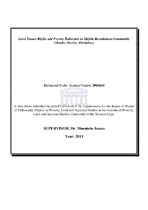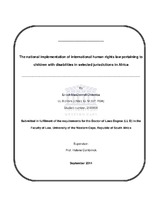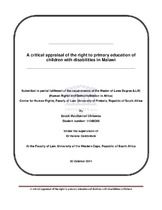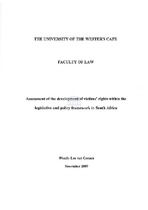Land tenure rights and poverty reduction in Mafela resettlement community (Matobo District, Zimbabwe)
Abstract
In this research, I present critical facts about Land Tenure Systems and Poverty Reduction processes in Mafela Resettlement community. I focus mainly on the Post-Fast Track Land Reform (2004 ; 2011) period and the interactive processes in this new resettlement area. The research - premised on the rights approach - sought to explore land tenure rights systems and poverty reduction mechanisms seen by the Mafela community to be improving their livelihoods; it also sought to find out if there is evidence linking tenure rights to poverty reduction and how land tenure rights governance systems affect their livelihoods. Suffice to say in both the animal kingdom and human world, territorial space and integrity, its demarcation as well as how resources are used within the space, given the area - calls for a - defined system of rights by the residents themselves. Whilst it is true that there is no one story about Zimbabwens land reform (Scoones et al 2011) the contribution of this research towards insights emanating from the newly resettled farmers adds another invaluable contribution in the realm of rural development issues. The oft rigidified perceptions about the land reform in Zimbabwe as having dismally failed draw contrasting findings from this research. The findings, themselves drawn mainly through interviews, seem to suggest that there are indeed improved livelihoods for resettled farmers more than what is generally believed from a distance. The perception that secure tenure rights (among other myths) determines livelihoods improvement also revealed otherwise with Mafela community. The resettlers dynamic socio-economic milieu presents opportunities and challenges which only the resettled farmers can solve if given adequate support and empowerment in terms of decision making processes. The power basis wielded by the war veterans and the culture of top-down decision making processes as lamented by the resettled farmers suggest that the evolution of resettlements is still far from over. This research therefore hopes to challenge its readers and other stakeholders to engage with issues and recommendations raised here in order for a rethink about land tenure rights and poverty reduction initiatives associated with the new resettlement areas in Zimbabwe in general.
Related items
Showing items related by title, author, creator and subject.
-
The national implementation of international human rights law pertaining to children with disabilities in selected jurisdictions in Africa
Chilemba, Enoch MacDonnell (University of Western Cape, 2014)This thesis considers two jurisdictions, namely Malawi and South Africa, and attributes the problem to the lack of appropriate national implementation of the applicable human rights law by these states. Consequently, the ... -
A critical appraisal of the right to primary education of children with disabilities in Malawi
Chilemba, Enoch MacDonnell (University of the Western Cape, 2011) -
Assessment of the development of victims' rights within the legislative and policy framework in South Africa
Van Gensen, Wendy-Lee (University of the Western Cape, 2009)This study assesses the development ofvictims' rights in the legislative and policy framework in South Africa. It is argued that although victims' rights are recognised more has to be done to concretise these rights.




